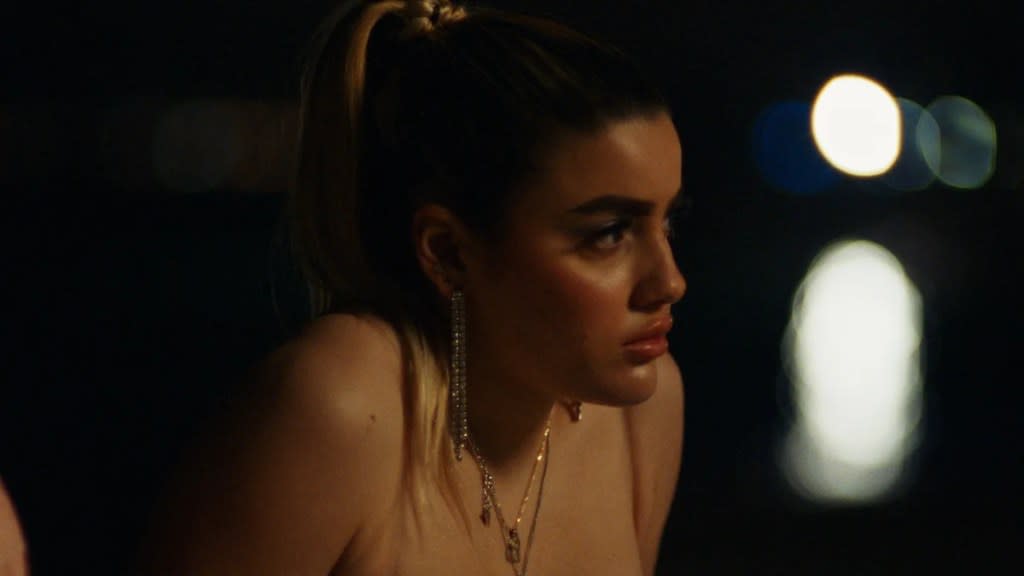‘Wild Diamond’ Review: Cannes Character Study Is Empathetic and Unforgiving

Liane Pougy, the young woman at the heart of Agathe Riedinger’s “Wild Diamond,” has big dreams and a loose plan to achieve them that relies on praying novenas to St. Joseph and courting the interest of reality TV producers. If that sounds like an odd pair of allies to be seeking, Liane’s dream — to become a social media influencer, or a reality star, or a spokesperson or someone significant and loved — is nebulous and difficult enough that an underprivileged teen from a coastal town in the South of France will need all the help she can get.
Liane has carved her personal ambitions out of the detritus of Planet Kardashian: She worked a waitress job until she saved enough money for breast implants, but now she mostly shoplifts, sells what she can get on the street, posts on social media and records videos for her 10,000 or so fans, who seem to view her either as a goddess to be worshiped or a slut to be shamed. Her ambitions verge on the ludicrous; this is a story where when you find out what she wants to achieve, you think, this isn’t going to end well – and even when she does achieve some of it, you still think the same thing.
Riedinger, one of only four female directors in the Main Competition at the Cannes Film Festival, is smart enough to not give Liane a conclusive ending, happy or otherwise. “Wild Diamonds” is a character study both of Liane and of the culture that has spawned her, and a film that manages to be both empathetic and unforgiving. It won’t make you think she’s making smart choices, but you’ll understand why she’s making bad ones.
Riedinger’s film is the only debut feature to receive a competition berth at this year’s Cannes, but it feels like the work of a more experienced filmmaker who knows what she wants and has a pretty good idea about how to put it on the screen. Based loosely on Riedinger’s 2017 short film “J’attends Jupiter,” it presents social-media and reality-TV stardom as a pie-in-the-sky way to escape a life of poverty – and more to the point, a way to substitute the love of a big, faceless audience for the neglect Liane felt from a mother who at one point sent her to a group home because she was “unmanageable.”
For Liane, it’s about the surgery that will make her irresistible to her “fans”; the rhinestones applied just the right way to the impossibly high heels that are deforming her feet; the perfect dress even if she can’t afford it; the elaborate makeup regimen to turn her into a queen on screens; the right moves in the right underwear lit by the right ring lights and shot to the right music. In one of the first scenes, she freaks out on a train when a man contemptuously calls her a whore; in fact, she’s a virgin, embracing the visual vocabulary of sex without having much interest in the deed itself.
When Liane gets a call from the casting director of a reality show called “Miracle Island,” she figures her time has come. The interview with the casting director sends up a barrage of red flags as the woman makes it clear she expects the participants to have sex, act sassy and stand out in any way they can – but to Liane it’s the gateway to the promised land, so she immediately runs out and drops 600 Euro on a shiny, asymmetrical minidress. (She even pays for it instead of shoplifting it because the casting director warned her that a police record will get potential contestants banned.)
The rest of the movie finds Liane growing increasingly desperate as she waits to hear back from the show, but Riedinger doles out the small pleasures, the moments of humiliation and the growing sense that as far as Liane is concerned, it’s “Miracle Island” or nothing. In scene after scene, her leg jiggles nervously as she insists that she’s going to get on the show, she’s going to be famous, she’s going to be rich and, above all, she’s going to be loved. First-time actress Malou Khebizi makes her longing palpable; it wouldn’t be entirely accurate to compare what she does to Ellen Burstyn’s shattering arc in “Requiem for a Dream,” but neither would it be entirely wrong.
For much of the film, the edges of the frame constrict Liane; the film is shot in the boxy 4:3 aspect ratio, which gives the image little detail beyond the frantic young woman at its center. When the screen does open up occasionally, it’s brief and abrupt, which only emphasizes how the walls are usually closing in.
“The world desperately needs beauty,” one character says toward the end of “Wild Diamond.” But Agathe Riedinger’s film makes it clear that that proclamation isn’t optimistic, it’s sad. This story is about the desperation, not the beauty.
The post ‘Wild Diamond’ Review: Cannes Character Study Is Empathetic and Unforgiving appeared first on TheWrap.


